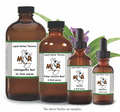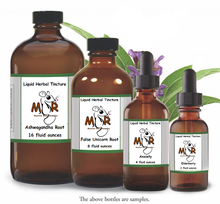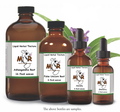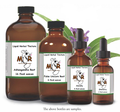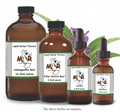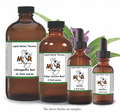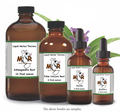 Loading... Please wait...
Loading... Please wait...- Home
- Herbal Tinctures
- Herbal Tinctures - Single Herbs
- Ginger Root Tincture
- Home
- Herbal Tinctures
- Ginger Root Tincture
Product Description
Ginger Root Tincture
Ginger is a time honored remedy for upset stomach, indigestion, motion sickness, diarrhea and cramps. This food additive has also been used to help reduce fevers, relieve pain, reduce inflammation and help remove toxins from the body. In the news, important research done in 2009, from the University of Michigan has indicated that Ginger has caused ovarian cancer cell death in laboratory tests. Ginger root composes many essential nutrients and vitamins such as vitamin B-6, pantothenic acid (vitamin B-5) that are required for optimum health. Furthermore, the herb also contains a good amount of minerals like potassium, copper, manganese and magnesium. Potassium is an important component of cell and body fluids that help to control heart rate and blood pressure. A few preliminary studies suggest that Ginger root extracts may lower cholesterol and help to prevent blood from clotting. It has been used throughout the world as an important cooking spice and to treat the common cold, headaches, symptoms associated with virus, and painful menstrual periods.
Ginger is warming and stimulating and has been used as a medicine in Asian, Indian and Arabic herbal traditions since ancient times. Today, health care professionals may recommend the use of Ginger root to help prevent or treat nausea and vomiting from motion sickness, cancer chemotherapy, after surgery and morning sickness. It has helped to promote gastric secretions, thus aiding with food absorption. It has been used as a digestive aid for mild stomach upset caused by indigestion, heartburn, flatulence and colic. Although this is an old-time remedy for morning sickness, pregnant women should use Ginger sparingly and only with doctor's approval.
Ginger root is also known to reduce the pain of osteoarthritis. As an anti-inflammatory, painkiller (analgesic), nerve soothing, anti-pyretic as well as an anti-bacterial. According to studies in Iran, Ginger extract is at least as effective as ibuprofen for relieving pain and inflammation. It has been used for relief of headaches, migraines, vertigo, joint aches and pains and arthritis. Ginger's anti-inflammatory properties are said to help bursitis and sprains. The herb inhibits the production of immune system components that create a long-term tendency toward inflammation and stimulates blood circulation, offering pain relief, increased joint mobility, decreased swelling and morning stiffness. Some people with chronic lower back pain have found Ginger to be effective in their treatment. It is also used for stimulating circulation and will help to warm cold hands and feet.
This sweet, pungent, aromatic and warming herb is still considered a fine treatment for congestion, colds and other viral infections, asthma and chronic bronchitis. It is said to ease cold symptoms. It has a beneficial effect on the lungs, helping to dispel mucus and phlegm. Taken hot, it promotes sweating and very helpful during cold and flu season. The extract of this root will stimulate the saliva and help to soothe sore throat and the pain associated with strep throat.
Ginger has qualities that help to combat H. pylori, which can be useful in fighting ulcers. Because compounds found in Ginger root stimulates the digestive juices, it may also aggravate peptic ulcers. One of Ginger's healing benefits is its ability to reduce inflammation, as noted by the University of Maryland Medical Center, due to its anti-inflammatory and antioxidant qualities. Used in this way ginger might relieve the inflammation associated with ulcerative colitis. In addition, Ginger root increases circulation for faster healing and helps to remove the toxins from the body by aiding in digestion. This is particularly helpful in digesting rich, fatty foods. Ginger is considered effective in combating parasitic infection. Ginger has been included with sushi to ward off parasites and also to clear the palate and improve digestion. The antibiotic activity of Ginger may strongly inhibit the growth of salmonella and other bacteria. It is slightly diuretic and further cleanses the body by strengthening kidney function and increasing kidney filtration.
Ginger root extracts have been used as natural blood thinners and may help to prevent strokes, heart attacks and hardening of the arteries. Because of its blood thinning qualities, there has been promising research to show Ginger's effectiveness in preventing clotting and protecting nerve cells in the brain. Ginger has also been used to retard the production of cholesterol by the liver, and is believed to reverse the increase in triglycerides and LDL cholesterol, which may be helpful in heart conditions.
Ginger root tincture is also thought to relieve both the pain and to stop the production of hormones that cause swelling in fibrocystic breasts. New research from the University of Michigan has indicated that Ginger causes ovarian cancer cell death. And it did so in a way that may prevent tumor cells from becoming resistant to treatment, a common problem with chemotherapy. Ginger can cause autophagic cell death in addition to apoptosis, it may circumvent resistance to conventional chemotherapy.
Some recent research indicates that Ginger is useful in the treatment of minor burns and skin inflammations. Ginger on the skin can increase the skin's radiance and decrease inflammation that may contribute to conditions such as psoriasis. Ginger's antioxidant properties inhibit harmful free radicals that cause skin damage and aging, promoting smoothness and an even skin tone. The extracts have been found to useful for lightening age spots, while acting as an energy-booster in spa treatments. By this action, it is believed to improve circulation and it is often used in cellulite-reducing treatments. Ginger has antiseptic and anti-inflammatory that are shown to be acne fighting ingredients for killing the bacteria that causes acne, and reducing inflammation on the skin.
Nutrients: Amino acids, calcium, essential fatty acids, iron, magnesium, manganese, phosphorus, potassium, selenium, zinc, vitamins A, B1, B2, B3, B6 and C.
Drug interactions: Interacts with Heparin and Warfarin. Check with your physician if you are taking Ticlopidine. Supports interaction if on chemotherapy drugs, general anesthetics and nitrous oxide.
Ingredients: Fresh Ginger Root and Certified Grain Alcohol. 1:3 ratio
Suggested: Use 6-12 drops in juice or water, under the tongue or as desired. May be taken 3 times daily. Shake well. Store in cool dark place. Keep out of reach of children.
Precautions: People taking blood thinners (Coumadin, aspirin, etc.) should avoid Ginger, and the herb should be avoided for two weeks prior to elective surgery. Pregnant women should not take large amounts of Ginger for morning sickness, nor for prolonged periods and only after consulting a physician. Ginger increases bile production and should not be used by people with peptic ulcers, gallstones or gall bladder disease, unless supervised by a doctor.
Disclaimer: The information presented herein by Mountain Maus Remedies is intended for educational purposes only. These statements have not been evaluated by the FDA and are not intended to diagnose, cure, treat or prevent disease. Individual results may vary, and before using any supplements, it is always advisable to consult with your own health care provider.








